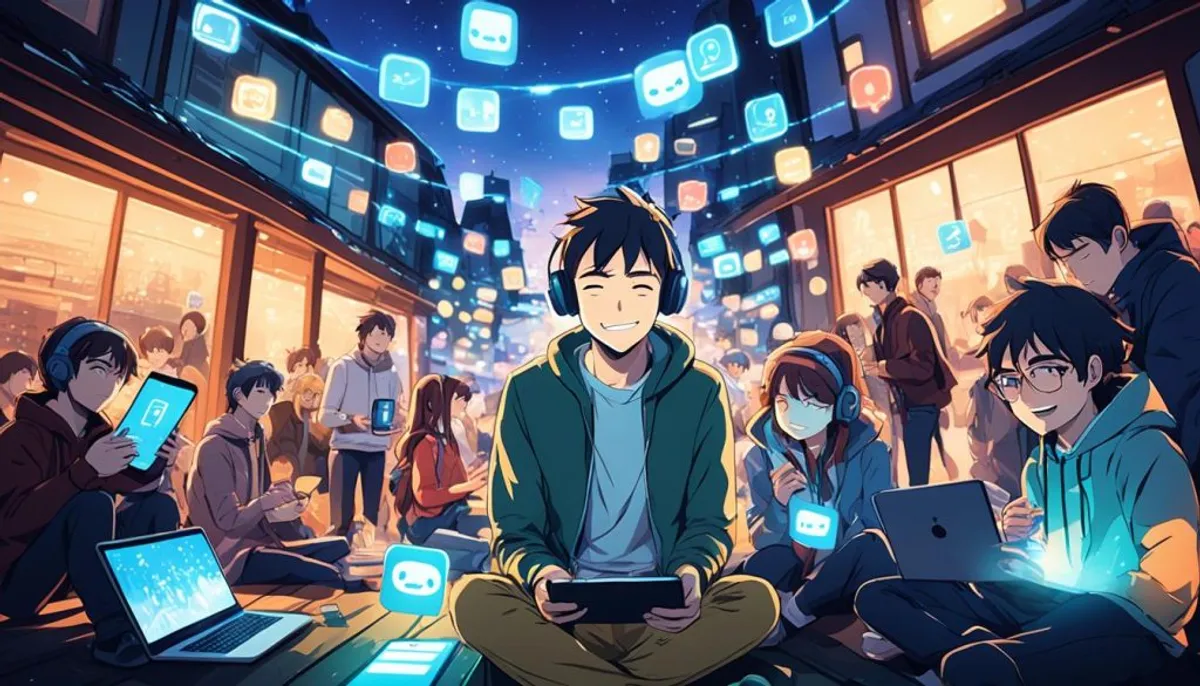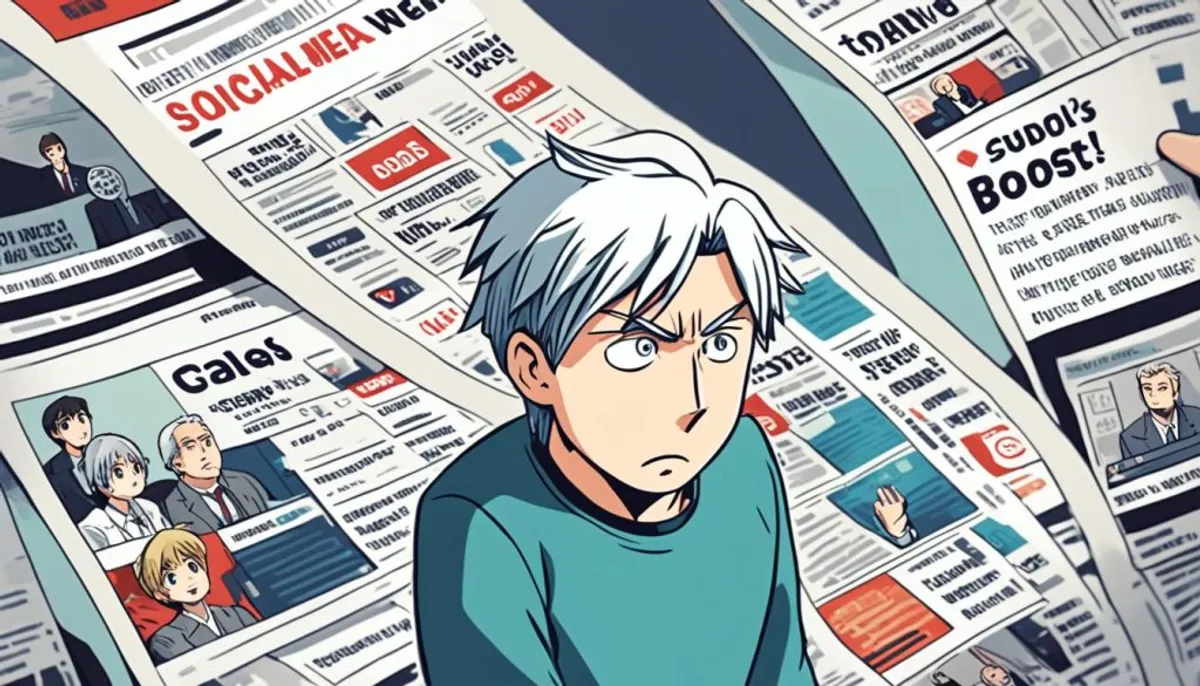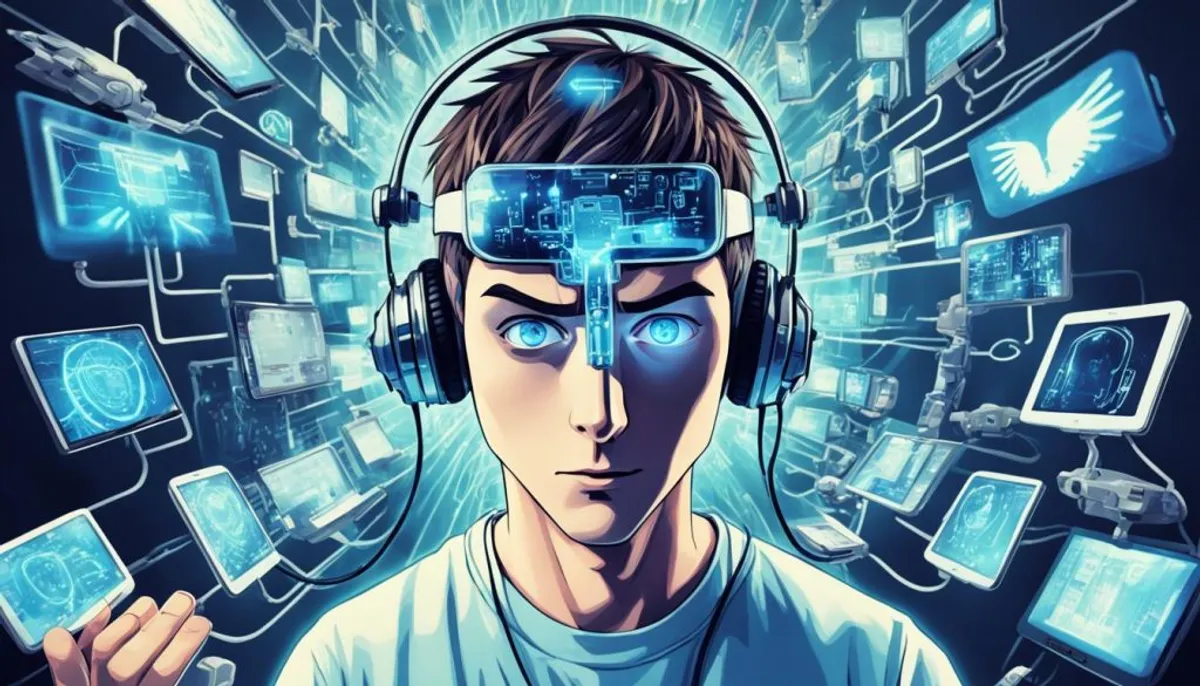Social media has become a big part of our lives. It connects us with people around the world. But it also has drawbacks that we might not see right away. It’s important to know how too much social media can affect us. This includes our mental health, privacy, and even our relationships and society.
This article looks at the bad sides of social media. We will talk about how too much time online can harm us. Our goal is to help you understand the problems that come with social media.

Key Takeaways
- Social media can hurt our mental health, leading to anxiety, depression, and poor body image.
- Posting personal stuff online can risk your privacy. It might lead to identity theft or people using your info wrongly.
- Cyberbullying and harassment are big problems on these platforms. They can cause a lot of emotional pain.
- Fake news and wrong info spread fast on social media. This is bad for public talks and harmony in society.
- Spending too much time on social media can become an addiction. This is not good for our productivity and happiness.
The Mental Health Risks of Social Media
Studies show social media can hurt mental health, mainly in the young. Sites like Facebook and Instagram are linked with problems like stress, sadness, low self-belief, and body unhappiness.
A study by Facebook noted Instagram harms body image in one out of three teen girls. It also boosts feelings of anxiety and depression among teens.
Social media can be a place for cyberbullying and online harassment, hurting mental health even more. Risky behaviors seen as normal on these sites can also affect mental health badly.
“The impact of social media on mental health among young people is a growing concern. It is crucial to recognize these risks and take proactive steps to mitigate them.”
The Link Between Social Media and Mental Health
Too much social media time can make you feel lonely, isolated, and like you’re missing out. Seeing perfect images of others’ lives often leads to self-doubt and feeling not good enough.
Cyberbullying is widespread online and causes a lot of stress. Anonymity on social media makes bullies more daring, adding to the stress.
Social media doesn’t just affect one person but can bring bigger problems like addiction, less work done, and spreading false info. It’s important to know the dangers of social media use and tackle them.
The Importance of Mitigating Mental Health Risks
To protect mental health today, we need to take action. There are ways to lessen the bad effects of social media:
- Limit social media use and set boundaries to avoid harmful content.
- Look for positive online groups that support good mental health.
- Do things offline and spend time with real-life friends.
- Take breaks from digital devices to stay mentally healthy.
Knowing the social media risks for teens and acting to stay safe is key. We must look after our mental health in this digital time and find a balanced way to use social media.
| Effects of Social Media on Mental Health | Statistics/Examples |
|---|---|
| Anxiety and Depression | Instagram contributed to experiences of anxiety and depression among teenage users (Facebook internal study). |
| Low Self-esteem and Body Image Dissatisfaction | Instagram worsened body image issues for one in three teenage girls (Facebook internal study). |
| Cyberbullying | Social media platforms serve as platforms for cyberbullying, leading to psychological distress. |
| Risk-taking Behaviors | Social media normalizes risk-taking behaviors, potentially compromising mental well-being. |
Privacy Concerns and Identity Theft
Sharing personal info on social media can lead to privacy issues. People often share without thinking of the risks. This leaves them open to identity theft and scams.
Social media platforms get flak for how they handle our data. They can use our info for ads without asking us. This worries many about our online privacy.
We should be careful on social media to stay safe. Checking privacy settings and sharing less can help a lot. It can keep us from privacy problems.
“It is crucial for individuals to be aware of the privacy risks and take measures to protect their personal information when using social media platforms.”
Be mindful of what you share, like your full name or where you live. Giving away too much can put you at risk.
Social media might sell our info to others. This makes ads too personal, feeling like our privacy is invaded.
You can limit privacy issues by implementing parental controls for kids. Manage what apps can know about you, use ad blockers, and share less info with social platforms.
Be careful who you connect with and keep an eye on your account. Watching for strange logins can protect your privacy.
Taking steps to protect our info helps us feel in control. It lowers the risk of identity theft and scams online.
Cyberbullying and Online Harassment
Social media is where cyberbullying and harassment often happen. These platforms let people hide who they are. This makes some feel free to harm others without getting caught, contributing to disrupted sleep patterns for those affected.
Cyberbullying is a big problem today. Those who are bullied feel alone, scared, and sometimes don’t want to live anymore. It’s very serious.
“Cyberbullying can cause long-lasting emotional scars and greatly impact the mental well-being of individuals.” – Expert Name
To stop online abuse, social media companies need to act. They must create strong rules and check posts more carefully. But, everyone must help by being careful and reporting bullies.
Recognize the Signs and Take Action
- Watch for signs like not wanting to hang out, acting differently, or not using phones or computers. Help those who seem bullied and tell them to get help.
- If you see someone being mean online, tell the social media site. Keep track of what they did or said as proof.
- Talk about cyberbullying in schools and groups. Teaching people can help stop it.
- Help and support places that offer help to those hurt by online bullying.
Let’s all work towards being kinder online. We each have a role in making the internet a better place. Together, we can fight cyberbullying and encourage a friendly online world.
Spread of Misinformation and Fake News
Social media platforms easily spread fake news, which harms public discussion and society. These platforms can split society and twist public views. It’s important for us to know the negative effects of using social media.
Platforms are trying hard to stop the spread of false news. They use fact-checks and algorithms to catch or delete bad content. Alongside these efforts, digital addiction concerns have emerged, pushing us to check facts and sources before we share information.
“The spread of fake news on social media is a serious concern, as it can influence public opinion and cause real-world consequences. Users must exercise caution and be mindful of the information they consume and share.”
We can fight fake news by promoting thinking skills and media knowledge. It’s key to check information sources, compare facts, and use trusted news outlets. Focusing on teaching media literacy and backing fact-checking can help stop fake news on social platforms.
Examples of Fake News Stories:
1. False claims surrounding the effectiveness of certain medications in treating COVID-19.
2. Baseless conspiracy theories about political leaders or government organizations.
3. Misinformation regarding climate change and other environmental issues.
4. Hoaxes and fabricated stories targeting individuals or organizations for personal or political gain.
Impact of Fake News:
| Impact | Description |
|---|---|
| Public Perception | Misleading information can shape public opinion, influencing societal discourse and decision-making processes. |
| Social Division | Fake news can deepen existing societal divides by spreading misinformation that aligns with preconceived biases and beliefs. |
| Trust Erosion | The prevalence of fake news erodes trust in established media sources, hindering the dissemination of accurate and reliable information. |
| Health Concerns | Fake news pertaining to health-related topics can lead to harmful behaviors or misinformation regarding treatments and prevention methods. |
| Economic Impact | Investors and businesses can be influenced by false information, leading to volatility in markets and financial decisions. |
Be careful with social media news. Think deeply and check facts before sharing. The social networking effects of misinformation can be profound, and we can build a smarter society by fighting fake news together.

Impact on Relationships and Social Interactions
Social media has connected people worldwide. Yet, it also hurts real-life relationships. The pressure to look perfect online can cause misunderstandings offline. Also, always being online can harm in-person connections, affecting relationship depth and quality. These social networking effects can lead to a decrease in meaningful interactions and emotional connections.
People often seek approval online more than making real connections. It’s key to find a balance. Ensure social media does not replace real, face-to-face time spent with those you care about.
Focusing on real-life talks helps build trust and understanding. Being together offers chances for real emotional links and empathy. These are hard to get just online.
“Great talkers are not great doers.” – William Shakespeare
Shakespeare’s idea applies to social media too. Real relationship quality comes from personal talks and shared moments. These can’t happen the same way online.
Strategies for Nurturing Real-Life Connections:
- Designate tech-free times or spaces to prioritize quality time with loved ones.
- Engage in activities that require face-to-face interaction, such as cooking together, exploring nature, or playing board games.
- Practice active listening and empathy to deepen connections and understanding.
- Cultivate a strong support system with trusted friends and family members outside of social media.
- Limit screen time and establish boundaries for social media use to create a healthier balance.
To lessen social media’s negative effects, focus on real interactions. By doing so, you can build deeper, more meaningful relationships.
Digital Addiction and Productivity Loss
Social media has become a big part of our daily lives, offering ways to connect with others. Yet, its addictive qualities raise issues. The endless scrolling, constant notifications, and the hunt for likes can lead to too much screen time. Additionally, social media accessibility can impact how we engage with these platforms, influencing our overall experience.
This addiction hurts many areas of life, especially work productivity. Spending too much time on social media distracts us from important duties. It makes it hard to focus and slows down our work, costing us valuable time.
Also, digital addiction can mess with our sleep. Scrolling through feeds late into the night harms sleep quality. The blue light from screens disrupts our natural sleep cycles, causing sleep trouble and fatigue during the day.
Our mental health can also take a hit from too much social media use. It can make us feel bad about ourselves, doubting our worth. Seeing perfect images of others’ lives leads to unhealthy comparisons and a skewed view of reality.
To keep a balanced tech life, we need to watch how much we use social media and set limits. Some steps to beat digital addiction and boost work include:
- Limit your social media time.
- Turn off notifications to reduce distractions.
- Create screen-free areas or times.
- Pick up non-digital hobbies or physical activities.
By following these tips and choosing real interactions over screen time, we can manage our digital usage. This helps improve work efficiency and fosters a better balance between digital and real life, especially in the context of addressing issues like cyberbullying in social media.

Testimonials
“When I saw how social media hurt my work, I made a change. Setting limits on my social media time helped me focus better and do more each day.”
– Sarah Thompson, Freelance Writer
“Mindless social media use wasted my time and left me feeling unproductive. Starting a digital break and setting social media rules boosted my work and made me happier.”
– Mark Johnson, Entrepreneur
| Disadvantages of Digital Addiction | Impact |
|---|---|
| Decreased productivity | Reduced output, missed deadlines, poor time management |
| Sleep disturbances | Insomnia, disrupted sleep patterns, daytime fatigue |
| Low self-esteem | Feelings of inadequacy, constant comparison, distorted self-perception |
| Compromised mental well-being | Increased anxiety, stress, and depression |
Corporate Influence and Manipulation
Social media platforms are often criticized for allowing corporate influence and manipulation. They use algorithms that highlight sensational content. This leads to a lot of clickbait and divisive stories. Users end up seeing biased information, which creates echo chambers and warps reality.
Users need to recognize these tactics and look for different viewpoints and trustworthy news. By checking the facts and source’s reliability, people can fight the negative impact of corporate power on social media.
The Impact of Corporate Influence
“Social media has grown into a key avenue for companies to sway public opinion and consumer habits. Through ads, sponsored posts, and partnerships, businesses can push their messages on these platforms. Often, it’s hard to tell apart what’s an ad and what’s not.” – Marketing expert, Jane Stevens
Corporate influence on social media can blur the real from the promotional. This power affects not just ads but news, entertainment, and even our conversations online.
Moreover, social media algorithms enhance content that makes us react strongly. They prioritize making us engaged over giving us accurate information. This can spread false news and make corporate influence even worse.
Building Resistance to Manipulation
To deal with corporate influence and manipulation on social media, users can try several methods that emphasize mindfulness and presence:
- Look for different viewpoints: Follow accounts and content from a variety of perspectives to get a full picture of issues.
- Check facts and sources: Before sharing information from social media, make sure it’s true and comes from a reliable place.
- Think about the motive: Understand why a post is made. Not all content aims to inform – some want to sell something or influence opinions for other reasons.
- Learn about tactics: Knowing how companies manipulate on social media helps develop critical thinking and resistance.
Striving for a Balanced Online Experience
Despite its benefits, it’s important to use social media wisely and limit corporate influence. Building a diverse network, evaluating information carefully, and understanding content motives can create a healthier online space.
| Advantages | Disadvantages |
|---|---|
| Enables global connectivity | Promotes corporate influence and manipulation |
| Facilitates communication and information sharing | Spreads misinformation and sensationalized content |
| Allows for targeted advertising | Privacy concerns and data exploitation |
| Provides a platform for creativity and self-expression | Mental health risks and addictive behavior |
Conclusion
Social media has changed how we talk and connect with others. But, it has its issues too, including the importance of social media accessibility. We must use these sites wisely and carefully.
Using social media can lead to mental health problems and privacy issues. It can also cause cyberbullying and spread false information. It’s important to know these risks.
By being smart about how we use social media, we can keep our minds healthy and our private life safe. This also helps us keep good relationships.
Questioning the information we see online and looking at different viewpoints can help. This way, we avoid being tricked or biased by what we read and see on social platforms.
It’s all about finding the right balance between the good and bad sides of social media. By understanding its downsides, we can use it in a better, healthier way. This lets us stay connected without harming our well-being.
FAQ
What are the disadvantages of using social media?
Using social media can hurt your mental health and privacy. It can lead to cyberbullying and false information. In some cases, individuals may seek a temporary restraining order to protect themselves from online harassment. You might also face addiction and less contact with others in real life.
How does social media affect mental health?
Social media can make people feel anxious, depressed, and bad about how they look. It’s especially hard on young people’s mental health.
What are the privacy concerns associated with social media?
Sharing too much online can risk your privacy. You could face identity theft or scams. It’s important to be careful with what you share.
How does social media contribute to cyberbullying and online harassment?
Online, people can hide who they are. This makes it easy for them to bully or harass others, leading to issues such as cyberbullying in social media. This can make people feel alone or even harm themselves.
What is the impact of the spread of misinformation and fake news on social media?
False news on social media can harm society. It can quickly spread, changing what people think and causing division. It’s a big problem for everyone.
How does social media affect relationships and social interactions?
Social media can cause problems in friendships and with family. Misunderstandings are more common. The need to look perfect online can also hurt real connections.
Can social media usage lead to digital addiction and productivity loss?
The need to constantly check social media can become an addiction. This can mess up your sleep and focus. It’s not good for your well-being.
How does social media contribute to corporate influence and manipulation?
Social media may push exciting content that’s not always true. Users might only see things that make them click or get upset. This can twist what’s real.
What steps can individuals take to mitigate the drawbacks of using social media?
People can limit their social media use wisely. It’s key to question what you read. Always check facts and listen to different views.
RelatedRelated articles



